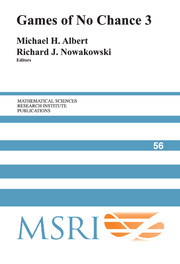Book contents
Preface
Published online by Cambridge University Press: 28 February 2011
Summary
The June 2005 Combinatorial Game Theory Workshop was held at the Banff International Research Station (BIRS) and organized by Elwyn Berlekamp, Martin Mueller, Richard J. Nowakowski, and David Wolfe. It attracted researchers from Asia, Europe, and North America. The highlights were many and the results already have had a great impact in the field.
Aaron N. Siegel had his hand in quite a few of the highlights. Some of his groundbreaking work is presented in “Loopy games,” with applications given in “Coping with cycles” and “Backsliding Toads and Frogs.” His work with J. P. Grossman, “Reductions of partizan games,” showed that the reduced canonical form of a game exists. This approximation to the canonical form has already proved very useful; it has been used, for example, in the Mesdal ensemble's analysis of Partizan Splittles as well as in the analysis of other games.
In “Advances in losing,” Thane E. Plambeck surveys the state of the art for last-player-to-move-loses games. Even more advances in this area were made during the conference, primarily by Plambeck and Siegel. Indeed, the approach of forming a monoid of game positions in order to discover the structure of winning and losing positions in a misère game has subsequently matured sufficiently that the BIRS Games Workshop in January 2008, had misère games as one of its main themes.
Eric J. Friedman and Adam S. Landsberg unveiled the use of renormalization, a technique from physics, to give very intriguing results about Chomp.
- Type
- Chapter
- Information
- Games of No Chance 3 , pp. ix - xPublisher: Cambridge University PressPrint publication year: 2009



